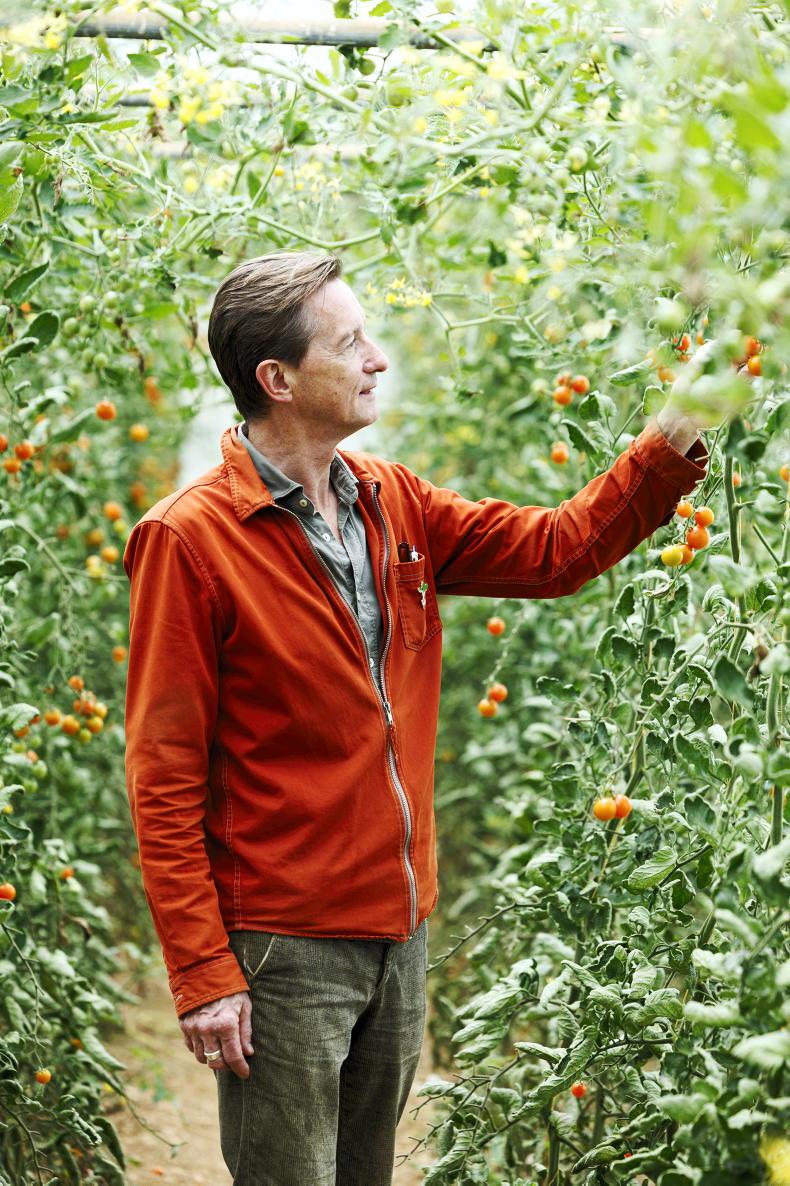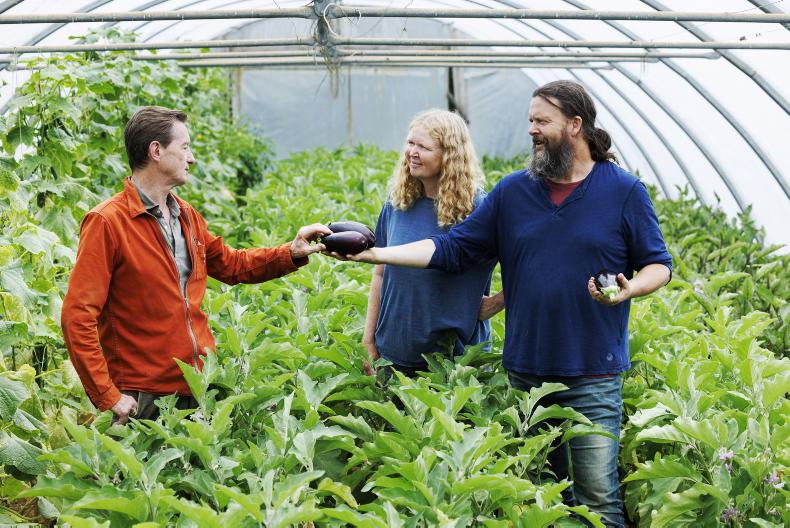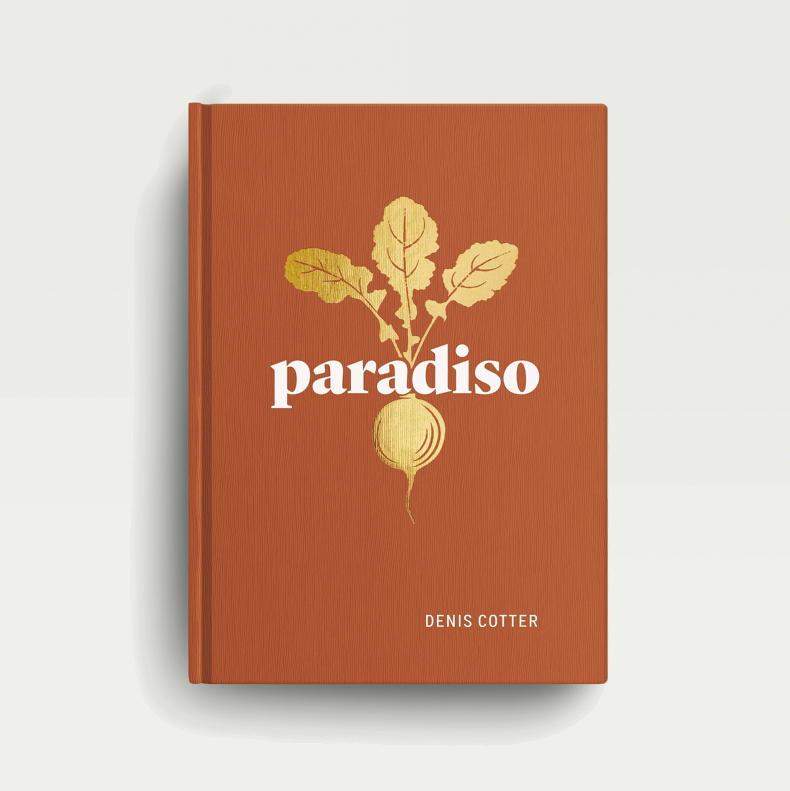‘I’ve only ever done what I wanted – and it has worked for me,” chef and owner of the iconic Paradiso restaurant in Cork, Denis Cotter, explains over a cup of coffee.
Many restaurants – for a variety of reasons – do not withstand the test of time. There are, however, some which do. Paradiso is one of these restaurants, and it has just celebrated its 30th year in operation (first opening in 1993). Denis believes being able to reinvent yourself every few years is one of the keys to longevity, though he admits to Irish Country Living that there were probably other factors at play driving the restaurant’s initial success.
“The university is nearby and I didn’t realise we were in a good location [because we were away from the main areas of footfall], but it turned out that we were,” he says. “Everybody who came in the door had made a decision to come here; they were willing to give it a go.”

Denis Cotter owns and operates Paradiso restaurant, which just celebrated its 30th year in business. \ Donal O' Leary
Veggie paradise
Paradiso was one of Ireland’s first vegetarian restaurants, and is certainly the most celebrated. While obviously meat-free, the restaurant is frequented by people of all diets and descriptions, which is how Denis likes it. Labels were never really his thing.
“At the time [of opening], I was a vegetarian and I wanted to have my own restaurant,” he says. “I’m still more or less a vegetarian; I eat fish occasionally. I was kind of tired of my ‘dietary whatever’ having an ‘ism’ attached to it. So I thought, ‘If I eat fish twice a year, I won’t be a vegetarian and people would stop calling me things.’ But then they started calling me a pescetarian! And I’m not one of those either,” he smiles.
Because Paradiso has only ever dealt with vegetables, Denis doesn’t feel the novelty or point of difference other chefs might feel about making them the main ingredient in a dish. That said, the food at Paradiso was never going to be the salad, risotto or pasta you see as the ubiquitous vegetarian option on most menus.
“I never had a culinary style, tradition or food culture, really, so I had massive freedom [with Paradiso],” he explains. “It wasn’t about ‘being inventive’ or working with particular vegetables. But I think, because you’re not starting with a piece of meat on a plate, it’s possible to be more inventive on starting points or combinations.”

Over the years, Denis, Lucy and Ultan have developed a symbiotic relationship which benefits them all. \ Donal O' Leary
A shift to local
In Paradiso’s early years, Denis says the food was more recipe-focused than driven by seasonality. For him, everything changed when he began working with Irish farmers, and two in particular: Ultan Walsh and Lucy Stewart at Gort na Nain farm in nearby Nohoval.
“Not to get too reverential, but at that point it became about, ‘OK, he has loads of spinach – what am I going to do with the spinach?’ or, ‘He has loads of courgettes – what am I going to do with those for the next six weeks?’ It wasn’t a case of ‘I want to make an Indonesian curry – where will I find the ingredients?’ It was, ‘I have this, what will I do?’ I had no traditional way of thinking or attachments, so it became possible to think about Irish carrots and Indonesian curry at the same time.”

Paradiso Cookbook was published earlier this year by Nine Bean Rows books
Meet the farmer
Denis first met Ultan when Paradiso had been open for around five years. Originally a microbiologist working in research at University College Cork, Ultan was feeling disenchanted with his day-to-day. He and Lucy, a Cork city librarian, had been growing their own vegetables for several years and felt this was something they could expand on in a business sense.
“I decided I wanted to leave [my job], but I had no idea of what I really wanted to do,” Ultan explains. “One of the things I thought was I could try leasing land and growing vegetables, and maybe I could learn how to do it on a bigger scale. So the first year we leased an acre of land from and friend and neighbour. That went reasonably well, in that we made some good decisions in what we could grow and some really, really bad ones – but the good ones gave us the encouragement to go on and try it again next year and grow more of the good stuff.”
Budding relationship
After Ultan left his job, he started growing commercially. He and Lucy have now been farming for 22 years. They eventually purchased land of their own and three years later, Lucy also left her job to work on the farm. They currently grow on their own 9ac, both in polytunnels and outdoors. They built up their clientele gradually, with Denis as their first customer, but it was always Ultan’s aim to work directly with chefs.
“The first year we started with Denis, I just grew vegetables that I liked myself,” Ultan says. “And one of the things I really like are globe artichokes. At the time, not really many people were growing them. So I rang up Denis and asked, ‘Would you be interested in buying vegetables?’ And he said, ‘Not really.’ He had a few other suppliers. But he said to come in for a chat. So I went in and he asked, ‘What are you growing at the moment?’ And I listed them off including, globe artichokes, and he said, ‘Why are you growing them?’ And I said, ‘Well, I just really like them; they’re my favourite vegetable.’ He said, ‘Wow, do you have any at the moment?’ And then, immediately, he was buying our vegetables.”
Growth
Ultan’s approach of growing what he liked mirrored Denis’ own approach to food. The following year, Ultan and Lucy were able to invest in some polytunnels which helped increase their annual yield and variety of vegetables. They developed a symbiotic relationship with Denis which has benefitted them both, over the years.
“At that stage, I was just growing outdoors and it’s very hard to make a living,” Ultan says. “We got a couple of tunnels again on leased land [from another neighbour who gave us a quarter of an acre] and we started to grow sungold tomatoes and other things Denis suggested would work well in the restaurant.”
Planning the year
“We then moved on from simply buying their produce to sitting down and planning the year together,” Denis says. “We need to plan ahead, because if Ultan grows too much, we’re in trouble – if he doesn’t grow enough, he’s in trouble – so we try to know what’s coming. On the other side of that is the hungry gap [the months where nothing grows]. We haven’t put up a flag saying: ‘We only buy stuff from one farm.’ We depend more on other ingredients during the hungry gap. We take what we can.”
Ultan and Lucy continue to grow unique varieties of vegetables, but also vegetables they love to eat themselves – this past year saw harvests of asparagus, San Marzano tomatoes and sweetcorn among many other things. While they love this work, they also have various other interests, including music and art. For them, growing vegetables for a living enabled them to live the life they always wanted for themselves.
“Ultan’s actually a really good cook. He’s really good at everything! Such an annoying person,” jokes Denis.
Paradiso: Recipes and Reflections
After 30 years on the Cork food scene, Denis’ latest cookbook, Paradiso: Recipes & Reflections, is a reflection of where the restaurant is now and how to replicate some of their inventive recipes at home.
An accomplished author with four previous cookbooks under his belt, including The Café Paradiso Cookbook (1999), Paradiso Seasons (2003), Wild Garlic, Gooseberries … and Me (2007) and For the Love of Food (2011), Paradiso: Recipes and Reflections is Denis’s first book in 12 years. It is now available in book shops throughout Ireland. Check out https://paradiso.ie/. For more information on Gort na Nain farm, you can follow them on Instagram @gort_na_nain.
Read more
GIY's Mick Kelly on Food Matters, Grow HQ and our food system
Instagram and dairying - for this Co Tipperary farmer; they're the perfect mix
‘I’ve only ever done what I wanted – and it has worked for me,” chef and owner of the iconic Paradiso restaurant in Cork, Denis Cotter, explains over a cup of coffee.
Many restaurants – for a variety of reasons – do not withstand the test of time. There are, however, some which do. Paradiso is one of these restaurants, and it has just celebrated its 30th year in operation (first opening in 1993). Denis believes being able to reinvent yourself every few years is one of the keys to longevity, though he admits to Irish Country Living that there were probably other factors at play driving the restaurant’s initial success.
“The university is nearby and I didn’t realise we were in a good location [because we were away from the main areas of footfall], but it turned out that we were,” he says. “Everybody who came in the door had made a decision to come here; they were willing to give it a go.”

Denis Cotter owns and operates Paradiso restaurant, which just celebrated its 30th year in business. \ Donal O' Leary
Veggie paradise
Paradiso was one of Ireland’s first vegetarian restaurants, and is certainly the most celebrated. While obviously meat-free, the restaurant is frequented by people of all diets and descriptions, which is how Denis likes it. Labels were never really his thing.
“At the time [of opening], I was a vegetarian and I wanted to have my own restaurant,” he says. “I’m still more or less a vegetarian; I eat fish occasionally. I was kind of tired of my ‘dietary whatever’ having an ‘ism’ attached to it. So I thought, ‘If I eat fish twice a year, I won’t be a vegetarian and people would stop calling me things.’ But then they started calling me a pescetarian! And I’m not one of those either,” he smiles.
Because Paradiso has only ever dealt with vegetables, Denis doesn’t feel the novelty or point of difference other chefs might feel about making them the main ingredient in a dish. That said, the food at Paradiso was never going to be the salad, risotto or pasta you see as the ubiquitous vegetarian option on most menus.
“I never had a culinary style, tradition or food culture, really, so I had massive freedom [with Paradiso],” he explains. “It wasn’t about ‘being inventive’ or working with particular vegetables. But I think, because you’re not starting with a piece of meat on a plate, it’s possible to be more inventive on starting points or combinations.”

Over the years, Denis, Lucy and Ultan have developed a symbiotic relationship which benefits them all. \ Donal O' Leary
A shift to local
In Paradiso’s early years, Denis says the food was more recipe-focused than driven by seasonality. For him, everything changed when he began working with Irish farmers, and two in particular: Ultan Walsh and Lucy Stewart at Gort na Nain farm in nearby Nohoval.
“Not to get too reverential, but at that point it became about, ‘OK, he has loads of spinach – what am I going to do with the spinach?’ or, ‘He has loads of courgettes – what am I going to do with those for the next six weeks?’ It wasn’t a case of ‘I want to make an Indonesian curry – where will I find the ingredients?’ It was, ‘I have this, what will I do?’ I had no traditional way of thinking or attachments, so it became possible to think about Irish carrots and Indonesian curry at the same time.”

Paradiso Cookbook was published earlier this year by Nine Bean Rows books
Meet the farmer
Denis first met Ultan when Paradiso had been open for around five years. Originally a microbiologist working in research at University College Cork, Ultan was feeling disenchanted with his day-to-day. He and Lucy, a Cork city librarian, had been growing their own vegetables for several years and felt this was something they could expand on in a business sense.
“I decided I wanted to leave [my job], but I had no idea of what I really wanted to do,” Ultan explains. “One of the things I thought was I could try leasing land and growing vegetables, and maybe I could learn how to do it on a bigger scale. So the first year we leased an acre of land from and friend and neighbour. That went reasonably well, in that we made some good decisions in what we could grow and some really, really bad ones – but the good ones gave us the encouragement to go on and try it again next year and grow more of the good stuff.”
Budding relationship
After Ultan left his job, he started growing commercially. He and Lucy have now been farming for 22 years. They eventually purchased land of their own and three years later, Lucy also left her job to work on the farm. They currently grow on their own 9ac, both in polytunnels and outdoors. They built up their clientele gradually, with Denis as their first customer, but it was always Ultan’s aim to work directly with chefs.
“The first year we started with Denis, I just grew vegetables that I liked myself,” Ultan says. “And one of the things I really like are globe artichokes. At the time, not really many people were growing them. So I rang up Denis and asked, ‘Would you be interested in buying vegetables?’ And he said, ‘Not really.’ He had a few other suppliers. But he said to come in for a chat. So I went in and he asked, ‘What are you growing at the moment?’ And I listed them off including, globe artichokes, and he said, ‘Why are you growing them?’ And I said, ‘Well, I just really like them; they’re my favourite vegetable.’ He said, ‘Wow, do you have any at the moment?’ And then, immediately, he was buying our vegetables.”
Growth
Ultan’s approach of growing what he liked mirrored Denis’ own approach to food. The following year, Ultan and Lucy were able to invest in some polytunnels which helped increase their annual yield and variety of vegetables. They developed a symbiotic relationship with Denis which has benefitted them both, over the years.
“At that stage, I was just growing outdoors and it’s very hard to make a living,” Ultan says. “We got a couple of tunnels again on leased land [from another neighbour who gave us a quarter of an acre] and we started to grow sungold tomatoes and other things Denis suggested would work well in the restaurant.”
Planning the year
“We then moved on from simply buying their produce to sitting down and planning the year together,” Denis says. “We need to plan ahead, because if Ultan grows too much, we’re in trouble – if he doesn’t grow enough, he’s in trouble – so we try to know what’s coming. On the other side of that is the hungry gap [the months where nothing grows]. We haven’t put up a flag saying: ‘We only buy stuff from one farm.’ We depend more on other ingredients during the hungry gap. We take what we can.”
Ultan and Lucy continue to grow unique varieties of vegetables, but also vegetables they love to eat themselves – this past year saw harvests of asparagus, San Marzano tomatoes and sweetcorn among many other things. While they love this work, they also have various other interests, including music and art. For them, growing vegetables for a living enabled them to live the life they always wanted for themselves.
“Ultan’s actually a really good cook. He’s really good at everything! Such an annoying person,” jokes Denis.
Paradiso: Recipes and Reflections
After 30 years on the Cork food scene, Denis’ latest cookbook, Paradiso: Recipes & Reflections, is a reflection of where the restaurant is now and how to replicate some of their inventive recipes at home.
An accomplished author with four previous cookbooks under his belt, including The Café Paradiso Cookbook (1999), Paradiso Seasons (2003), Wild Garlic, Gooseberries … and Me (2007) and For the Love of Food (2011), Paradiso: Recipes and Reflections is Denis’s first book in 12 years. It is now available in book shops throughout Ireland. Check out https://paradiso.ie/. For more information on Gort na Nain farm, you can follow them on Instagram @gort_na_nain.
Read more
GIY's Mick Kelly on Food Matters, Grow HQ and our food system
Instagram and dairying - for this Co Tipperary farmer; they're the perfect mix









 This is a subscriber-only article
This is a subscriber-only article













SHARING OPTIONS: